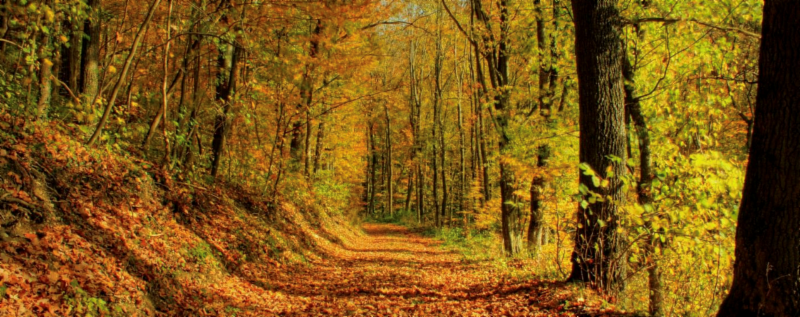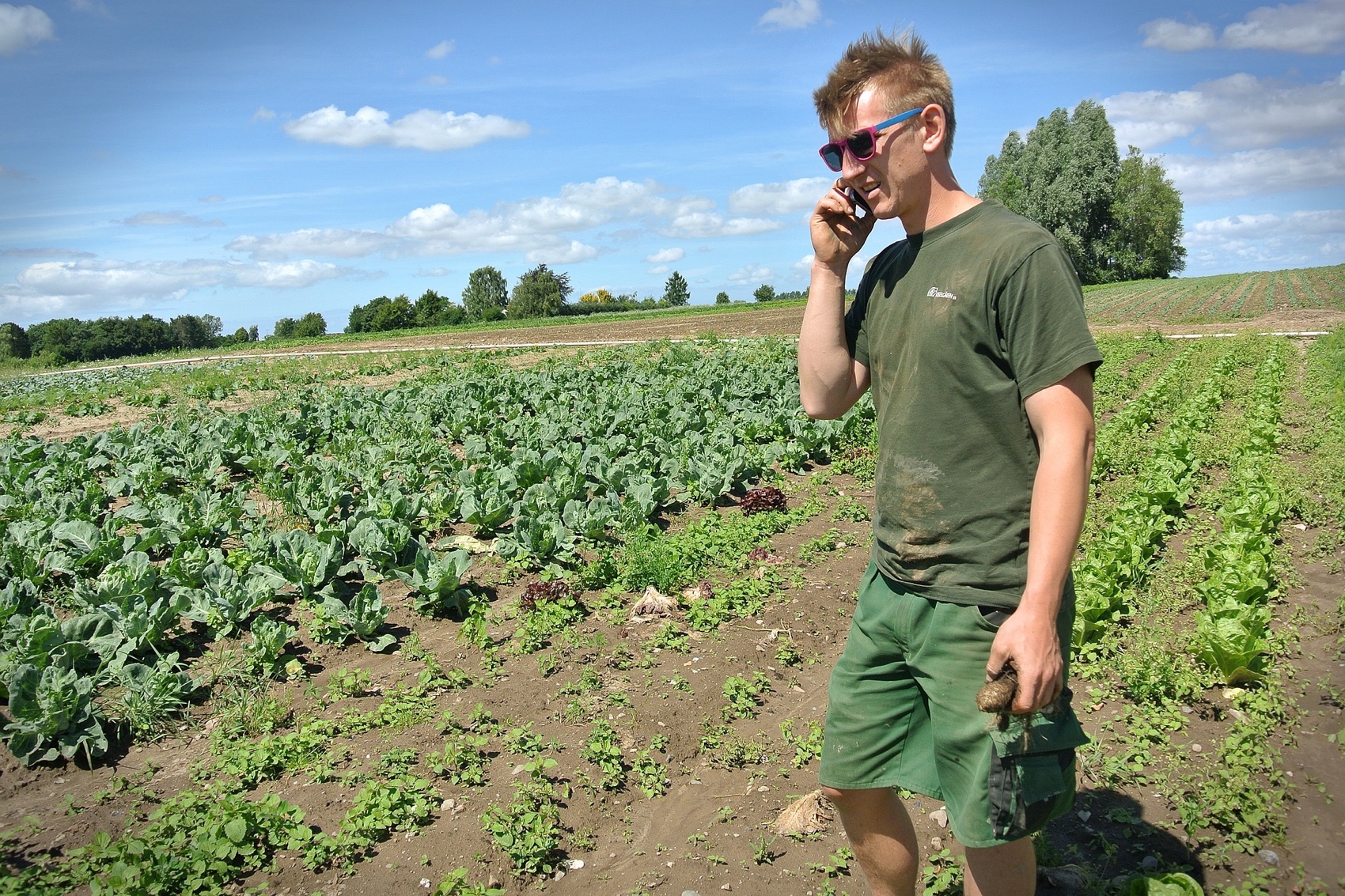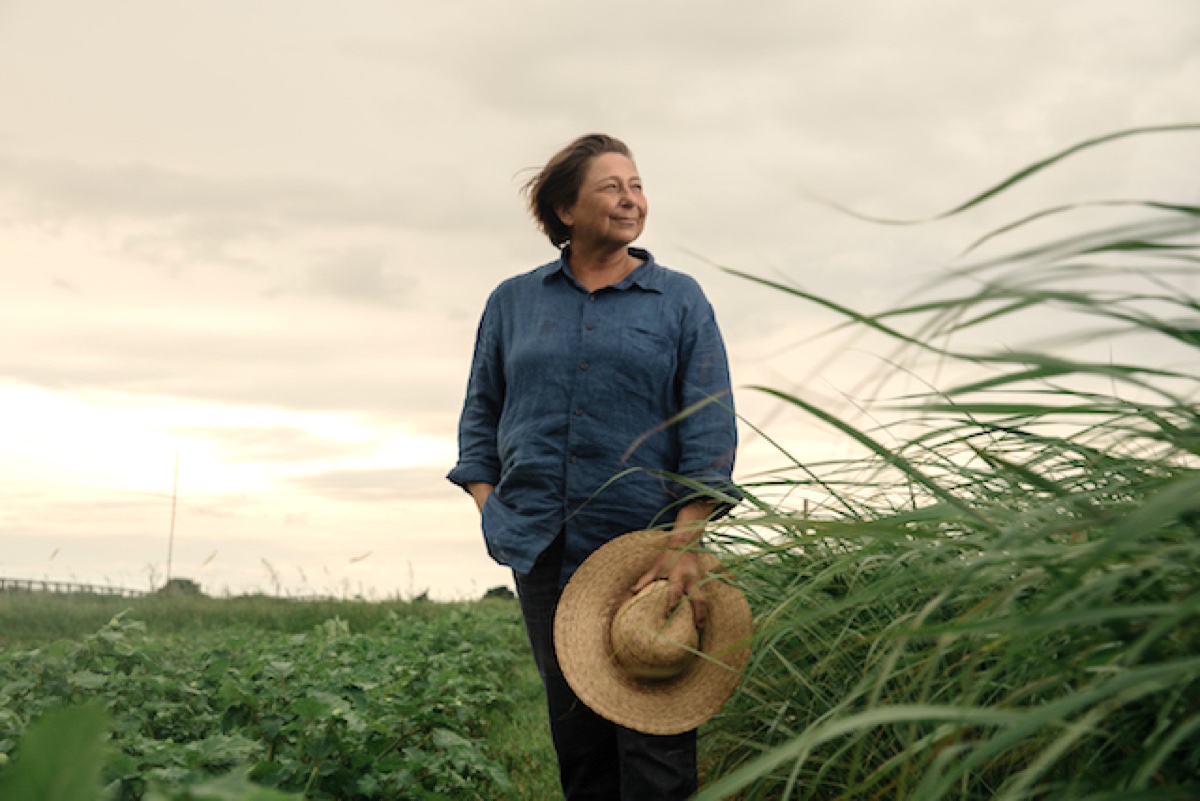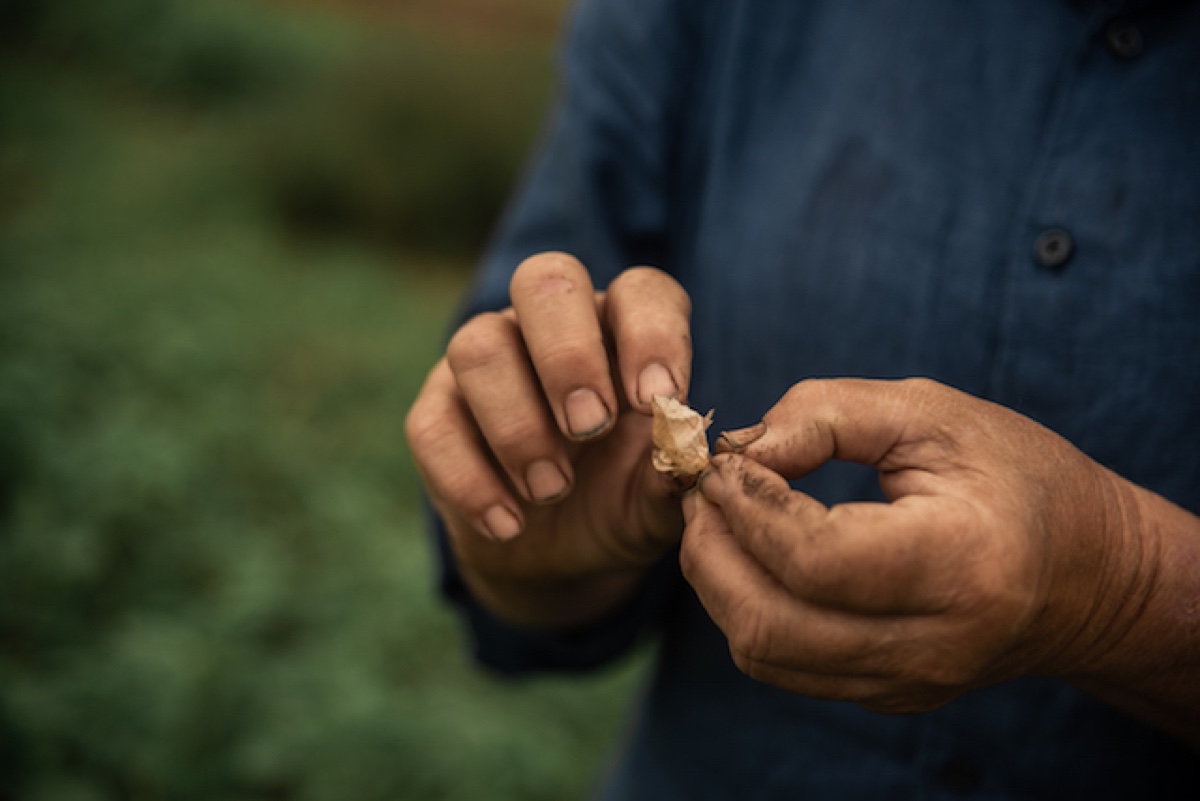Photo: Mimi Edelman’s crops are tethered to the Ark of Taste. (Credit: David Benthal)
It’s easy to dismiss that as generic committee-speak — is Slow Food about eating well or saving the planet? — but for many, the two are impossible to separate. “Food should have an identity, plain and simple,” said Laura Luciano, an East End resident (and designer by trade) who in 2017 was appointed Slow Food’s New York State Governor. “When a food loses its identity, its cultural value is lost. At Slow Food, we’re good at storytelling, and being around the table and having conversations about food is a way of supporting the community. It’s about joy and pleasure and coming together.”
“At Mimi’s, chefs have the chance to come out and walk the farm,” Luciano continued. “They’re able to see what she’s growing, and if they want an unusual variety, they can work together. They are proud to walk the farm and proud to put those things on their menus.”
It was a hot August afternoon when I first walked the farm with Edelman and Sandra Saiegh, a board member of the East End chapter of Slow Food. It’s one of the most active chapters in the United States, Saiegh told me, and has drawn attention for its promotion of edible school gardens. A partnership with the Joshua Levine Memorial Foundation provides funding to hire master farmers to work with nearly 20 local schools to start and sustain gardens and greenhouses. Just like chefs, children respond to the excitement of growing, and discover what it feels like to harvest their own food.
Saiegh is well-equipped to balance the concept of hyperlocal farming and its global ramifications: In her day job, as supply officer at the United Nations, her responsibilities include supervising the delivery of food and other relief supplies to peacekeepers around the world. She’s had firsthand experience of what biodiversity — in short, the variety of life found in a particular ecosystem — means for small, independent farmers.
“It’s key,” added Edelman, a longtime volunteer with Slow Food USA and co-chair of the Ark of Taste committee for the Northeast and New England. “For example, if a farmer only grows a few crops and one of them fails, then that farmer is in trouble.” That’s why she grows a broad array of herbs and vegetables, including three shishito pepper cultivars, three tomatillo cultivars, ginger, lemongrass, purslane, and basils that range from Genovese, with its familiar Mediterranean sunny pungency, to Asian varieties (lime, lemon, anise) and African basil, which has a heady fragrance, striking green-purple leaves and purple flowers. “I grow them for mixologists,” Edelman explained. “They use them for garnishes and simple syrups.”
Although Edelman works to help preserve some historic foods of our region, including the beach plum, sea robin and Long Island cheese pumpkin, her farm’s offerings are drawn from the world at large. For one chef, she cultivates Asian wing beans, with their distinctive ridged edges. For another, ‘Jimmy Nardello’s Frying Pepper,’ which takes its name from a seed saver who immigrated to Connecticut with seeds from Basilicata in 1887. Yet another needs leafy green heads of ‘Castelfranco’ radicchio, which are as pretty as wedding bouquets. Factor in Edelman’s experienced palate and artist’s eye, and you begin to understand why area chefs value their relationships with her.
“Texture, color and aroma are all important,” she said. “I’m thinking about how food will be plated.” That explains beets both round and cylindrical; ‘Paris Market’ carrots, a very sweet, stubby 19th-century heirloom; and tiny, exquisite currant tomatoes. “They’re the Pop Rocks of the tomato world!” she said.
Saiegh and I cradled handfuls of them and munched as we wandered the field behind Edelman, stepping around plantings of ‘Aunt Molly’s Ground Cherry’ (which is not an actual cherry at all, but a small husked ground tomato that tastes a little like pineapple), ‘Radiator Charlie’s Mortgage Lifter’ (a pink-fleshed beefsteak from the 1930s), ‘Fish Pepper’ (an African-American heirloom that predates the 1870s) and small ‘Tennis Ball’ lettuces (a butterhead type once grown at Monticello by Thomas Jefferson).
Every Ark of Taste food has documentation behind it, Edelman stressed. “I’m interested in how local pride in local ingredients is woven into a global effort to save wonderful flavors and the stories behind them,” she said.
She sends weekly field notes to her coterie of chefs, letting them know what’s available. Some write up menus for the week, others, for each day. “Every chef is individual in what he or she wants in terms of size and color, so I’ll text them photos,” she said. “And then I’ll harvest specifically for that chef.”
Any relationship between a chef and farmer requires trust and its flip side, surrender. “Mimi has to surrender to the environment and the weather and, in turn, we surrender to her,” said Kopels. When I asked him what he was going to be buying from Edelman in October, he replied that whatever she has, he’ll be using. “October brings an embarrassment of riches, and the only problem is editing,” he said. “Producers like Mimi will tell us what’s on the menu, and we trust that Mimi will grow the best products she can for us.” In other words, the food follows the farm.
Slow Food and the Ark of Taste
For more about Slow Food East End, visit slowfoodeastend.org. Anyone can nominate a food to be included in the Ark of Taste; if you visit slowfoodusa.org/ark-of-taste-in-the-usa, you can find out how.
And it’s not too early to begin thinking about next year’s garden. If you’re interested in growing Ark of Taste seeds, you can find them at the following sources:
Baker Creek Heirloom Seeds
Fedco Seeds
Hudson Valley Seed Co.
Nature and Nurture Seeds
Seed Savers Exchange
True Love Seeds





Recent Comments